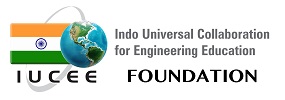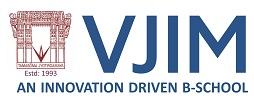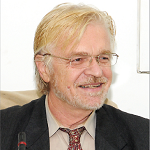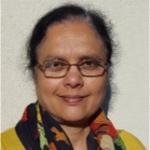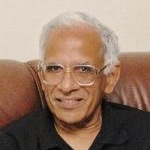International Conference on Transformations in Engineering Education
Theme: Reshaping Engineering Education for GenAI Era
January 8 to 10, 2025
IUCEE Annual Student Forum (IASF)
January 6 to 8, 2025
Venue: Vallurupalli Nageswara Rao Vignana Jyothi Institute of Engineering and Technology, Hyderabad, Telangana, India
The International Conference on Transformations in Engineering Education (ICTIEE) is one of the signature programs of the IUCEE Foundation. The Twelfth International Conference of Transformations in Engineering Education (ICTIEE-2025), will be held from January 8 to 10, 2025. This signature program of the IUCEE Foundation is held annually to promote sharing and collaboration among leaders, faculty, and students from various educational institutions. This event features expert talks from distinguished leaders in academia and industry, offering a platform for building a professional network. ICTIEE 2025 aims to connect global experts and passionate educators to enhance excellence in engineering education. The quality and quantity of research articles submitted to ICTIEE have been consistently increasing each year.
ICTIEE 2025 will be hosted at Vallurupalli Nageswara Rao Vignana Jyothi Institute of Engineering and Technology (VNR VJIET) & Vignana Jyothi Institute of Management (VJIM), Hyderabad, Telangana, India. The theme of ICTIEE 25 is “Reshaping Engineering Education for GenAI Era”.
In the era of GenAI, industries, economies, and societies are experiencing rapid transformation. As Gen AI continues to evolve, engineering education must adapt to prepare the next generation of engineers for a landscape dominated by intelligent systems. A shift in pedagogy and learning styles is need of the hour to cultivate adaptable minds, capable of leveraging AI technologies along with creativity and ethical reasoning essential for sustainable innovation. Institutions have to devise open minded and flexible solutions for accepting and adapting to challenges with the progress. Curriculum and assessment must be designed to prepare students to thrive in an AI-driven world and contribute positively to society. Avenues will be opened for student entrepreneurs and innovators capitalizing on AI’s capabilities to develop personalized products and services, optimize business processes, and address societal challenges. GenAI has its challenges and this year we intend to explore the perspectives with research and practice papers on the aligned area.
The IUCEE Foundation, VNR VJIET & VJIM invite faculty and other professionals to submit full-length original, unpublished research and practice papers that demonstrate contemporary research in engineering education in the following tracks, which focuses on the theme of the conference by August 15, 2024. Following the double-blind review process, accepted papers will be invited for presentations at the conference. Additionally, the selected and presented papers will be forwarded to the Journal of Engineering Education (JEET) for publication in a Special Issue.
Speakers
Call for Papers
Full-length original, unpublished research and practice papers in the tracks mentioned below (or themes of relevance to Engineering Education) are invited. Selected papers will be published in the special issue of the Scopus- indexed journal, Journal of Engineering Education Transformations (JEET).
“Papers relevant to Sustainability and Artificial Intelligence are particularly encouraged in any of the Tracks and Sub Tracks”
Important Dates
- Call for Papers – 01 June 2024
- Full Paper Submission Deadline – 15 August 2024
- Full Paper Status Notification – 15 October 2024
- Camera Ready Paper Submission Deadline – 15 November 2024
Registration Deadline
- Early Bird Registration – 30 November 2024
- Regular Registration – 10 December 2024
- Registrations Link – TBA
Registration Fees
| Registration | Early Bird | Regular |
|---|---|---|
| IUCEE Members-Authors | 10,000/- | 11,000/- |
| IUCEE Members-Delegates | 5,000/- | 6,000/- |
| Non-IUCEE Members-Authors | 11,000/- | 12,000/- |
| Non-IUCEE Members-Delegates | 6,000/- | 7,000/- |
| Foreign Authors / Delegates | $ 100 | $ 150 |
| + 18% GST will be applicable on the above registration fees | ||
- Prospective authors are invited to submit full-length papers on their original and unpublished research works in the tracks specified.
- The length of the paper shall be 4-8 pages with good clarity of the content (text, images and equations).
- The authors must follow the manuscript template provided while preparing the papers, click here to download the template.
- The authors need to specify the track and sub-track in the submitted manuscript. Refer to the website for the track and sub-track details.
- The paper submitted must be submitted in PDF format.
- All paper submissions are subject to a double-blind review process. Hence, any information identifying the authors or their institution should be anonymized while submitting the paper.
- Paper submitted will be desk rejected in the following cases:
- Non-compliance with double-blind submission policies
- Similarity index above 15%
- Out-of-conference scope submission
- Submitted papers will undergo a double-blind review process, assessing novelty, significance, scientific rigor, clarity, and quality.
- Submitted papers must not have been published as copyrighted material nor be submitted for consideration for publication as copyrighted material in print or electronic form.
- If selected for an in-person presentation, at least one of the authors must register for the conference to present their paper during the conference.
- Manuscripts of the selected papers will be forwarded to the Journal of Engineering Education Transformations (JEET) for publication in a Special Issue. (Scopus indexed Journal http://www.journaleet.in/).
- JEET will take at least three months to publish the paper in a special issue after the conference, and the period for Scopus Indexing is 6-12 months.
- Paper submission via email is not encouraged.
- Ensure that the title page of your PDF submission does not include authors’ names and affiliations. This information will be added to the final camera-ready copy if your paper is accepted. During the submission process, provide all author details only on the registration page. The PDF file should not contain any author information.
- Exclude any acknowledgments that may reveal authors’ identities or funding sources from the PDF submission for review. This information will be included in the final camera-ready copy if your paper is accepted.
- Avoid including project titles or names that could potentially lead to the identification of authors through a web search engine.
- Name your files carefully. The source file names (e.g., “Rajesh.pdf”) are often embedded in the final output as accessible comments.
- Use care in referring to your previous works as related works. Do not omit references to provide anonymity, as this leaves the reviewer unable to grasp the context. Instead, you can reference your past work in the third person format, just like any other piece of related work by another author. For example, instead of “Recently, we have proposed a new protocol [9] …,” sentences in the spirit of “Recently, the authors in [9] have proposed a new protocol …” may be used.
- Papers with the same title and abstract should not be posted on a public website, such as arxiv.org, or shared via public mailing lists or communicated to other conferences/journals/publications.
Contact:
For Paper Submission related queries: ictiee@iucee.org
Paper submission link: https://easychair.org/conferences/?conf=ictiee2025
About VNRVJIET & VJIM
VNR Vignana Jyothi Institute of Engineering and Technology (VNRVJIET) holds a prominent status in the educational landscape of Hyderabad, India. Established in 1995 under the auspices of the Vignana Jyothi Educational Society, the institute imparts high-quality technical education and cultivates a culture of innovation. VNRVJIET is committed to nurturing intellect and propelling societal progress through transformative education. Rooted in the philosophy of “Presencing,” the institute champions an educational approach where learning evolves into a profound voyage of self-discovery and collective empowerment.
Over nearly three decades, VNRVJIET has emerged as a leader in engineering education, offering a comprehensive array of undergraduate, postgraduate, and doctoral programs spanning various disciplines of Engineering and Technology. A cornerstone of VNRVJIET is its unwavering commitment to academic excellence, research progress, and strong collaborations with industry partners. The institution takes pride in its distinguished faculty who seamlessly integrate academic prowess with industry insights to deliver a well-rounded education to students.
Vignana Jyothi Institute of Management (VJIM), Hyderabad is an autonomous B-School founded in 1993 to develop professional managers. It is approved by AICTE, accredited by National Board of Accreditation (NBA) and South Asian Quality Assurance System (SAQS). It offers 2-Year Full-Time PGDM programs and is certified by AIU (Association of Indian Universities) as an MBA equivalent. The PGDM programs at VJIM aims to create holistic managers, synthesizing conventional and modern management thinking with a global outlook. VJIM equips students with core business skills together with the ability to manage their work creatively and strategically within the context of ethical standards. Appreciating the pace and direction of changes in international business education, the course structure at VJIM is continuously updated in line with the changing needs of the modern business world.
The Centre for Education Technology, established in 2016, serves as a pioneering force in shaping the evolution of educational methodologies at VNRVJIET. Guided by the transformative TPACK (Technological Pedagogical Content Knowledge) model, its mission is to leverage cutting-edge educational technologies to redefine global teaching and learning practices. By integrating expertise from pedagogy, cognitive sciences, computer sciences, and informatics, the Centre offers an innovative blueprint for educators. The Centre strives to cultivate dynamic digital learning environments that optimize student experiences. It empowers educators to adeptly utilize technology for personalized instruction and assessment while fostering a culture of continuous professional development and leadership. Through collaborative efforts, the Centre not only enhances content delivery by fostering engagement, interactivity, and adaptation to diverse learning styles but also addresses the training needs of newly inducted faculty. CET ensures that educators are equipped to navigate challenging classrooms with digitally savvy students, thereby contributing to transformative teaching and learning processes.

